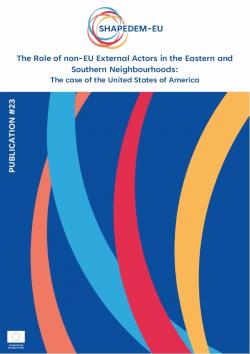The Role of non-EU External Actors in the Eastern and Southern Neighbourhoods: The case of the United States of America

This paper examines the evolution and divergence of U.S. democracy promotion efforts in the European Union’s Eastern and Southern Neighbourhoods between 2011 and 2022. It argues that while democracy promotion has featured prominently in U.S. foreign policy discourse, its practical application has been uneven and deeply shaped by geostrategic priorities. In the Eastern Neighbourhood, particularly in Ukraine and Georgia, U.S. support for democratic reforms has often aligned with broader geopolitical objectives – namely, the integration of these countries into Euro-Atlantic structures. In contrast, in the Middle East and North Africa (MENA), democracy promotion has consistently clashed with entrenched U.S. security and alliance interests, leading to a pattern of rhetorical commitment but limited and inconsistent practice. Despite brief moments of renewed emphasis, such as during the early 2000s Freedom Agenda and in the immediate aftermath of the 2011 Arab uprisings, U.S. policy in the MENA has largely reverted to supporting authoritarian stability over democratic transition. By comparing U.S. strategies in Ukraine and Georgia with those in the broader MENA region, the paper highlights the central role of geostrategy in shaping the limits and contradictions of American democracy promotion.
-
Dati bibliografici
SHAPEDEM-EU Publications, No. 23 (July 2025), 29 p.
Abstract
Introduction
1 US Democracy Promotion vs. Authoritarian Accommodation in the EU’s Southern Neighbourhood
1.1 US Democracy Promotion in the MENA: The Freedom Agenda & Arab Uprisings
2 US democracy promotion in the Eastern Europe: the cases of Georgia and Ukraine
2.1 The US support in rule of law, human rights, anticorruption, civil society, community-based organisations, youth and education: method and approach
2.2 Security and military support as a part of the democracy promotion
3 Conclusions
3.1 Democracy Promotion in the MENA: All Quiet on the Western Front
3.2 U.S. democracy (un)learning and adaptation in the EU’s Eastern neighbourhood
Bibliography



